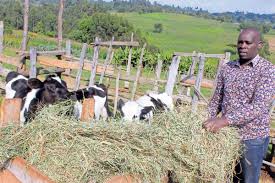Pastoralists at Isinya, Kajiado East Constituency are counting losses after hundreds of their livestock have starved to death in the prevailing drought condition.
Prices of livestock in drought-hit areas have dropped by nearly 90 per cent as farmers rush to dispose of their animals before they starve to death.
A mature cow that would have fetched a farmer more than Sh50,000 six months ago at the Isinya Market, for instance, can only sell at Sh5,000 leaving most herders counting losses as the drought continues to hit hard.
Efforts by a section of herders to relocate their livestock to the neighbouring counties have also not yielded much.
Alfred Nkekun, a herder in the town, told KNA that the situation is dire and farmers have been counting losses daily.
“As a herder, I don’t think I will be able to keep animals any longer. If need be, I will only keep a few. I’m making losses by buying hay for the animals, transportation and selling them at a throwaway price,” said Nkekun.
He added that although they are buying the feed for their animals, something might be wrong with the quality of the hay as animals were also dying of diseases that were being introduced by the feed they were getting.
“I’ve bought feeds for my animals but we have witnessed some types of diseases that have been brought about by the hay. We don’t have the time to investigate properly because, by the time we notice, a healthy sheep has passed on. So to further avoid losses farmers here are selling their herds at a low price to avoid plunging into further losses,” added Nkekun.
He said a mature animal fetches Sh5, 000, this is after a farmer has paid more than Sh500 for transport. A handful of animals die on the way, forcing owners to dispose of the carcasses at Sh150.
“We feed animals unable to stand on their feet with acacia tree leaves. We are watching our animals die helplessly,” said Alfred.
Joseph Matanda, another herder, said that they need more help from the government.
“Bringing our animals here at the slaughterhouse, we have to pay the county askaris Sh30 for sheep and goats and Sh50 for cows. Assuming I have come here with five sheep I’ve had to pay Sh150 this is minus the costs of transport and feed for the sheep before selling them. If the county government could remove such levies, we would be very happy.”
Other herders in the area also called on the county and national government to buy the meat from them and feed school-going children because as the drought situation worsens many children will have to be pulled out from school.
“If the national government and the county government as well could start a school feeding programme for children as a parent I will be happy as many children in the area have only a meal and others can go for days without food and this will see many dropouts as they go out to search for food,” said Solomon Leshang, a herder from the neighbouring town of Inkiito.
Mature goat and sheep prices have also dropped marginally, selling between Sh5, 000-Sh7, 000 from Sh9, 000 six months ago.
The drop in prices follows a predictable pattern that gets farmers and policymakers flat-footed every drought season, which ends with farmers selling their livestock at throw-away prices, raising concerns about the country’s disaster preparedness.
This year promises to be even more severe after annual rains failed for two consecutive years due to climate change that has diminished pasture and dried up seasonal rivers.
By Vivian Mbinya




